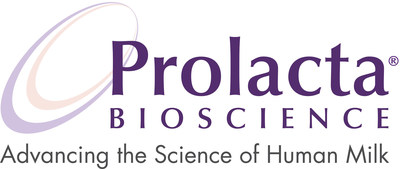

FORT WORTH, Texas, Sept. 29, 2017 /PRNewswire/ -- A panel of leading experts will examine the clinical benefits and access challenges of human milk as the standard of care for premature infants born weighing less than 1,250g (2 lbs 12 oz) at the Preemie Parent Alliance (PPA) 2017 Annual Summit, Sept. 29 through Oct. 1, 2017, in Fort Worth, TX.

The PPA Annual Summit provides a collaborative platform for parent organizations, healthcare professionals and care providers to identify and address the urgent needs of parents who have an infant in the neonatal intensive care unit (NICU). The Summit also brings leaders together from NICU parent support organizations across the country, and this year, one from Brazil.
The panel discussing the benefits of an exclusive human milk diet (EHMD)1 for premature infants will feature Scott Elster, President and CEO of Prolacta Bioscience®, the pioneer in human milk-based neonatal nutritional products for premature infants, as well as Melinda J. Elliott, M.D., Senior Director, Clinical Education and Professional Development at Prolacta, and Erin Hamilton-Spence, M.D., Neonatologist and Past President of the Mothers' Milk Bank of North Texas. Lisa Grubbs, PPA Leadership Team Member and founder of NICU Helping Hands, will facilitate the discussion, which will be held on Sept. 30 at 11 a.m. in the Hochberger Auditorium of Cook Children's Medical Center.
The panel will explore the following topics:
PPA Founder and President Keira Sorrells said, "Prolacta fully understands, respects and embraces the importance of educating and empowering parents, caregivers and parent support organizations to ensure the best nutrition for fragile babies. Our mutual commitment to meeting the unique needs of babies in the NICU makes a remarkable difference for these infants and their families."
When used as part of an EHMD, Prolacta's neonatal nutritional products are clinically proven to improve health outcomes2,3,4 and reduce hospital costs5,6 for critically ill, extremely premature infants weighing between 500-1,250g (1 lb 1oz to 2 lbs 12 oz) at birth, in the NICU, as compared to cow milk-based fortifier or cow milk-based preterm formula.
PPA is the nation's leading network of parent organizations offering support to families of premature infants through education, public policy, healthcare guidelines, advocacy and direct family support.
About Prolacta Bioscience
Prolacta Bioscience, Inc. is a privately-held life sciences company dedicated to Advancing the Science of Human Milk®. The company pioneered the development of human milk-based neonatal nutritional products to meet the needs of critically ill, premature infants in the NICU. Prolacta leads the industry in the quality and safety of nutritional products made from donor breast milk and operates the first and only pharmaceutical-grade manufacturing facility for the processing of human breast milk.
1 An EHMD is when 100% of the protein, fat and carbohydrates in an infant's intake are derived solely from human milk.
2 Sullivan S, et al. An Exclusively Human Milk-Based Diet is Associated with a Lower Rate of Necrotizing Enterocolitis than a Diet of Human Milk and Bovine Milk-Based Products. The Journal of Pediatrics. April 2010. 156(4):562-567. doi: 10.1016/j.jpeds.2009.10.040. The randomized study of 207 infants weighing 500-1,250g compared the benefits of an exclusive human milk diet with a diet of both human milk-based and cow milk-based products.
3 Cristofalo EA, et al. Randomized Trial of Exclusive Human Milk versus Preterm Formula Diets in Extremely Premature Infants. The Journal of Pediatrics. December 2013. 163(6):1592-1595.doi: 10.1016/j.jpeds.2013.07.011. The multicenter randomized controlled study examined 53 extremely premature infants weighing 500-1250g who were fed either a bovine milk-based preterm formula or an exclusive human milk diet, comparing the duration of parenteral nutrition, growth and morbidity.
4 Abrams SA, et al. Greater Mortality and Morbidity in Extremely Preterm Infants Fed a Diet Containing Cow Milk Protein Products. Breastfeeding Medicine. June 2014. 9(6): 281-0285. doi:10.1089/bfm.2014.0024. This cohort study included 260 extremely preterm infants born weighing less than 1,250g who received a diet that ranged from 100% cow milk to 100% human milk.
5 Ganapathy V, et al. Costs of Necrotizing Enterocolitis and Cost-Effectiveness of Exclusively Human Milk-Based Products in Feeding Extremely Premature Infants. Breastfeeding Medicine. February 2012. 7(1):29-37. doi: 10.1089/bfm.2011.0002. This cost-effectiveness analysis of 2,560 extremely premature infants less than 28 weeks gestational age in 257 hospitals nationwide, comparing the impact of an exclusive human milk diet composed of mother's milk fortified with a human milk-based fortifier versus mother's milk fortified with cow milk-based fortifier.
6 Assad M, et al. Decreased Cost and Improved Feeding Tolerance in VLBW Infants Fed an Exclusive Human Milk Diet. Journal of Perinatology. March 2016. 36:216-220. doi: 10.1038/jp.2015.168. The study retrospectively looked at 293 preterm infants between gestational ages of 23 to 34 weeks and birth weights between 490-1,700g in the Level III NICU. The study compared the clinical and financial impactsbetween infants that were fed an exclusive human milk diet; cow milk-based fortifier and maternal milk; mixed combination of maternal milk, cow milk-based fortifier and cow milk-based formula; and formula between March 2009 and March 2014.
SOURCE Prolacta Bioscience